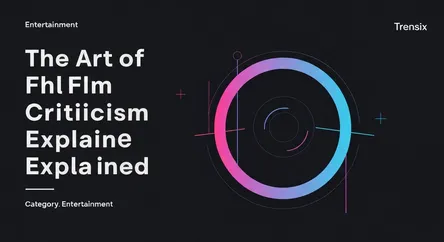Entertainment
The Art of Film Criticism Explained

Explore the world of film criticism, from its scholarly roots to its modern-day impact on how we watch and understand movies.
What is it?
Film criticism is the analysis and evaluation of films and the film medium. It goes beyond a simple 'thumbs up' or 'thumbs down' review, delving into a movie's artistic merits, cultural significance, and technical aspects. Critics examine elements like directing, screenwriting, cinematography, acting, and themes to form a comprehensive judgment. It can be a scholarly pursuit, found in academic journals, or a more accessible form of journalism in newspapers, magazines, and online publications. The goal is to provide context and insight, helping audiences engage with a film on a deeper level.
Why is it trending?
The internet has democratized film criticism, causing a surge in its popularity. Platforms like YouTube, Letterboxd, and countless podcasts allow anyone with a camera and an opinion to share their analysis, creating vibrant communities of cinephiles. This shift from traditional print media to digital formats has introduced a wider range of voices, including those from diverse backgrounds who offer fresh perspectives. Video essays, in particular, have become a popular format, combining visual analysis with critical commentary to create engaging and educational content for a global audience.
How does it affect people?
Film criticism significantly shapes public perception and can influence a film's box office success and awards potential. A positive consensus from critics can generate buzz and encourage people to see a movie, while negative reviews can deter them. For viewers, engaging with criticism can enhance their appreciation for filmmaking by highlighting nuances they might have missed. It can also introduce them to new genres, directors, and cinematic movements, broadening their tastes and fostering a more critical and informed approach to watching movies. Ultimately, it fuels conversation and keeps the art of cinema relevant.